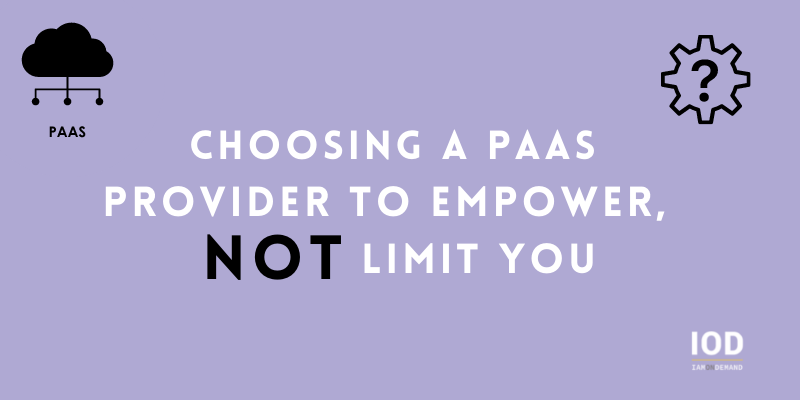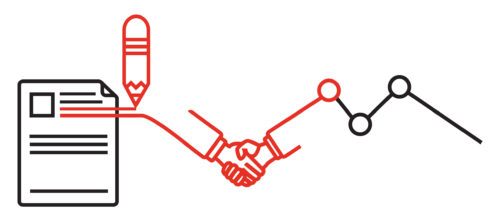As cloud computing continues exponential growth and adoption, numerous deployment strategies and models have emerged to meet the increasing demand and diverse needs of cloud users. PaaS (platform as a service) is a cloud computing model that allows you to develop, run, deploy, and launch applications and services over the internet without the constraints, complexity, and cost of building and managing the underlying cloud infrastructure—including storage, operating systems, servers, networks, and more.
PaaS provides the fundamental benefits of cloud computing—from turnkey provisioning and disaster recovery, to on-demand scalability and transparent pricing—all consistently managed. And, PaaS vendors provide developers with the tools and infrastructure to run needed programming languages and technology stacks.
The PaaS model offers further benefits, which include:
- Cost savings: With PaaS, you don’t have to buy, install, and maintain the software and hardware infrastructure associated with building and running a technology stack. You only pay for the resources you use—either via a subscription or pay-as-you-go.
- Faster development speed: PaaS frees up developers to focus on writing high-quality code, and more rapidly building and deploying applications.
- Faster innovation: PaaS allows businesses to become more responsive to innovative opportunities and initiatives such as mobile app development, blockchain, data analytics, chatbots, and more. Adopting PaaS also allows development teams to better innovate in response to both market opportunities and threats.
- Scalability: With PaaS, software teams are able to build applications that dynamically scale up or down based on demands and usage. Resource allocation and deallocation are also dynamically responsive.
Choosing a PaaS Cloud Provider
There are numerous PaaS providers that all provide a cloud environment for creating, deploying, and running custom, client-facing apps. So, it can be tricky to identify and choose the right provider for your needs from among the top vendors.
Before deciding on a PaaS vendor, consider how your organization will evolve, review what each platform offers, and choose the services and offerings that meet your organization’s technical requirements. Here are a few things to consider.
Languages and Frameworks
PaaS providers support a wide and varied range of programming languages and frameworks. The ideal PaaS provider should support your preferred and/or required languages and frameworks.
Compliance and Regulation
Before deciding on a PaaS provider, make sure that it adheres to industry standards and regulatory requirements. You should also understand how the provider intends to maintain compliance. PaaS vendors who adhere to recognized standards are more likely to ongoingly implement appropriate organizational and technical measures in accordance with best practices in the industry.
Reliability and Performance
Check that your potential PaaS provider has disaster recovery or fault-tolerant techniques in place to guarantee the availability of their services during an outage or major disaster. An ideal PaaS provider will have established strategies and processes for handling both planned and unplanned downtime.
Data Security
The heart of any application is data. This is why data storage is just the beginning; you must also understand how your data and applications will be secure. Be sure to read through the provider’s SLAs (service level agreements) to determine uptime guarantee, disaster management, and support. The right vendor will have ethical guidelines and clear policies with respect to confidentiality that ensure data security and privacy.
Enterprise Experience
Finally, review the PaaS provider’s past performance, including their business history and how long they’ve been providing PaaS solutions. It may also be beneficial to investigate the vendor’s track record with customer satisfaction, product reviews, and support, as well as whether the vendor has a history of data breaches or legal issues.
Top PaaS Providers and Solutions
The PaaS market is competitive, with many vendors offering unique solutions for enterprises to build customized applications. For the purposes of this discussion, I’ll introduce the three major providers and market leaders: Google AppEngine, AWS Elastic Beanstalk, and Microsoft Azure App Service.
Google AppEngine
Google AppEngine is Google’s PaaS solution that enables you to build, deploy, and scale applications, services, and websites on the same infrastructure as Google. AppEngine supports various programming languages and tools, including PHP, C#, Python, Go, Java, Node.js, and Ruby. It also supports other programming languages via custom routines and automatically scales to accommodate traffic spikes.
With Google AppEngine, you don’t need to install or maintain any physical server(s) or infrastructure. You only need to upload your application, and it’s ready to go. Plus, you can run your application in AppEngine using the standard environment or flexible environment, or a combination of both settings. AppEngine can also be integrated with other technologies and tools like MongoDB, Hadoop, PowerShell, CloudSDK, IntelliJ IDEA, Visual Studio, and Cloud Source Reps.
Following are some key features of Google AppEngine:
- API backends
- No configuration deployment
- Fully managed, serverless
- Open and flexible
- Managed SSL/TLS certificates
- Firewall and IAM capabilities
- Managed patching and traffic splitting
- App versioning and partitioning
AWS Elastic Beanstalk
AWS Elastic Beanstalk is a PaaS solution offered by AWS that enables you to seamlessly build, deploy, and manage services and applications developed with Java, Docker, Go, PHP, .Net, Node.js, Ruby, and Python on familiar servers such as IIS, Nginx, Apache, and Passenger.
Elastic Beanstalk allows you to run applications on AWS Cloud without the complexity of managing infrastructure. Like other PaaS providers, Elastic Beanstalk does the heavy lifting, automatically handling the load balancing, capacity provisioning, application health monitoring, and auto-scaling; your app is up and running immediately.
Elastic Beanstalk is user-friendly and easy to use, improves developer productivity, offers ample opportunity for customization, scales an application to handle peaks in traffic and workload, and helps businesses improve their efficiency.
The following are some key features of AWS Elastic Beanstalk:
- Multiple application deployment options: Visual Studio, Beanstalk CLI, Eclipse, AWS management console
- CloudWatch-based server monitoring
- Quick server configuration
- Highly flexible and scalable
- Enhanced security and autoscaling
- Multiple availability zones
- Integrates with a variety of standard development tools
Microsoft Azure App Service
Microsoft Azure App Service is a fully managed PaaS solution that enables you to quickly build, deploy, and scale mission-critical, customer-facing web applications, mobile back ends, and REST APIs in a single instance. Azure App Service supports various programming languages, including Node.js, Python, .NET, Java, PHP, Ruby, and .NET Core.
Azure App Service offers automated management, load balancing, security, and autoscaling, and allows you to build apps that can easily run and scale in both Linux- and Windows-based environments.
You can also leverage its DevOps capabilities such as integration with Docker Hub, custom domain, package management, staging environments, TLS/SSL certifications, GitHub, and continuous deployment from Azure DevOps. Azure App Service meets enterprise performance and security requirements, and it can handle up to 40 billion daily requests.
The following are some key features of Microsoft Azure App Service:
- High availability with auto-patching
- Built-in monitoring, load balancing, and autoscaling
- Supports Linux and Windows platforms
- Zero-deployment downtimes and built-in CI/CD integration
- DevOps optimization
- Authentication using Azure AD and other identity providers such as Facebook, Microsoft Live, and Google
- Containerization and Docker
Comparison Criteria
Comparison criteria | Google AppEngine | AWS Elastic Beanstalk | Azure App Service |
Scaling | Automatic, Manual, Basic | Automatic | Automatic |
Pricing model | Pay-as-you-go (based on Instance Class you specify for your application) | Pay-as-you-go (based on the resources needed to run your applications) | Pay-as-you-go (based on the App Service plan you run your applications on) |
Ease of set up | Easy | Easy | Easy, especially for those with .NET experience |
Programming language and framework support | Node.js, Java, Ruby, C#, Go, Python, and PHP | Java, Docker, Go, PHP, .Net, Node.js, Ruby, and Python | .NET, Python, Java, Node.js, Ruby, .NET Core and PHP |
Cloud vendor availability | |||
Initial release | April 2008 | January 2011 | June 2013 |
SLA | 99.95% | 99.99% | 99.95% |
Security compliance | ISO/IEC 27001, ISO, PCI, SOC 1, SOC 2, SOC 3 And more | ISO, PCI, SOC 1, SOC 2, and SOC 3 compliant | ISO, SOC, and PCI compliant |
IDE Integration | Yes | Yes | Yes |
Website | |||
Documentation |
Conclusion
PaaS is an efficient way for enterprises to build and run applications without the headache and cost of maintaining the necessary underlying tech infrastructure. Its flexible, cost-efficient, and scalable approach allows developers to focus on writing high-quality code and deploying applications faster. PaaS also helps accelerate business opportunities while ensuring app scalability, security, accessibility, and availability.
Fully research PaaS providers, selecting the one that meets your organization’s needs and demands.








